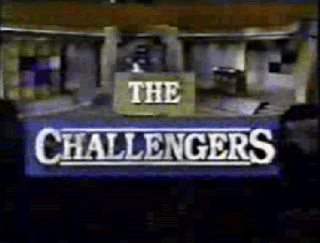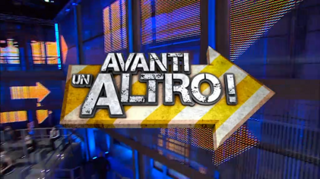The game is played by one person at a time. The player approaches from the front of the set to stand at a podium, opposite Gethin Jones. After a brief introduction, the player is given a £50 start and introduced to their first of ten questions, each of which increases in value. The player must answer all ten questions correctly in order to win this money – an incorrect answer at any stage means the player leaving the game with nothing.
To assist the player, the studio also houses 60 "traders" in a position normally reserved for an audience. On any one question, one of these traders can offer their knowledge at a prearranged price. If the player feels the need to ask for help, they must shout "Sell Me the Answer!" to the traders. At this point, the traders must try to attract the player's attention. The player then chooses two traders from the crowd. These two traders each have ten seconds to convince the player that they know the answer, before the player selects one of them. This trader then approaches the podium. A 30-second haggle now ensues in which the player and trader must decide on a price for the trader's information. If a deal is made, this amount is deducted from the player's pot and is given to the trader (whether they actually know the answer or not) and the players exchange information. If no deal is made, the trader leaves empty-handed and the player must answer on their own. Each trader may only be used once in the game, and the player may only use one trader per question.
Once the player has settled on an answer, they must "lock-down" on that answer using an oversized plunger on the podium. Jones then tells the player if they are right or wrong.
Once a player answers all 10 questions correctly, they face another choice: They may take all the money acquired so far (the sum of all question values, including the £50 start, minus the cost of all trades) or can choose to gamble everything on the Jackpot question. On this question, no help may be sought from the traders, so the player must answer on their own. A correct answer rewards the player with £25,000. An incorrect answer sees the player leaving with nothing.
Possible Strategies:
By the Player: The Player’s strategy would be to seek the help of the Sellers for all the questions whether he knows it or not. This would keep the audience guessing whether the Player actually knows the answer or not. The Player would maintain confidence and pretend that he knows the answer.
This would make the seller start the bid with reasonable amount. To the bid amount, the player may try to play on the skills/psyche of the Seller by even keep on reducing the earlier offer to show that the Player really knows the answer to compel the seller to agree to the Player’s offer.
Counter Strategy by the Seller: The Seller (who may or may not know the answer) would pretend that he knows the answer and is trustworthy. He would also try to guess whether the Player actually knows the answer or is bluffing. If the Seller feels that the Player knows the answer, the Seller may have no option but to agree to the Player’s offer. But, if the Seller feels that the Player is bluffing, he would keep on increasing his bid. If the final amount agreed by the Player is not satisfactory to the Seller, he may give a misleading answer to the Player (remember the Seller would anyway get the agreed amount whether the answer is right or wrong). The Player then would have to decide whether to go with the sellers answer or not. If the Player goes with the Seller’s misleading answer, the seller would have successfully sought revenge on the player for offering a very small amount.
In the current version the Seller will only win money if he provides the correct answer.
Possible win Scenarios:
Both Player and Seller Knows the correct answer Player knows the answer but the Seller is bluffing. Player does not know the answer but the Seller knows (in this case extracting the correct answer from Seller may depend on Player’s skill & Final Offer).

The Weakest Link is a British television quiz show, mainly broadcast on BBC Two and BBC One. It was devised by Fintan Coyle and Cathy Dunning and developed for television by the BBC Entertainment Department. The game begins with a team of nine contestants, who take turns answering general knowledge questions within a time limit to create chains of nine correct answers in a row. At the end of each round, the players then vote one contestant, "the weakest link", out of the game. After two players are left, they play in a head-to-head penalty shootout format, with five questions asked to each contestant in turn, to determine the winner.

You Don't Know Jack is a series of video games developed by Jackbox Games and Berkeley Systems, as well as the title of the first You Don't Know Jack game in the series. You Don't Know Jack, framed as a game show "where high culture and pop culture collide", combines trivia with comedy.
The Joker's Wild is an American television game show that aired at different times between 1972 and 2019. In the show, contestants answer questions based on categories determined randomly by a mechanism resembling a slot machine. The show's title refers to the game's slot-machine mechanism also having jokers.

The Challengers is an American game show that aired in syndication during the 1990-91 television season The series was created by Ron Greenberg and was based largely on his 1969 production, The Who, What, or Where Game. Dick Clark presided over the show with Don Morrow announcing. The Challengers was a joint production of Ron Greenberg Productions and Dick Clark Productions, with Buena Vista Television as distributor.

Game Ka Na Ba?, formerly Pilipinas Game Ka Na Ba is a Philippine game show created by ABS-CBN. The main goal of the game is to win 2 million pesos by answering trivia questions.
Shafted was a British game show that aired on ITV from 5 to 26 November 2001 and was hosted by Robert Kilroy-Silk.

Deal or No Deal is an Australian game show that originally aired on the Seven Network from 13 July 2003 to 4 October 2013. It was the first international version of the game show, after the original Miljoenenjacht from the Netherlands. It was the first of the versions to use the Deal or No Deal name. It was hosted by Andrew O'Keefe for its initial 10-year run.

Miljoenenjacht, officially Postcode Loterij Miljoenenjacht, is a Dutch game show, sponsored by the country's postcode lottery, where a contestant and at-home viewer could win up to €5,000,000 or as little as €0.01. The show is broadcast at various times, spanning across six episodes for each set. The program was originally shown by TROS on NPO 2, but moved to creator John de Mol's channel Tien in 2005. After the channel was discontinued after its sale to the RTL Group, the program moved to RTL 4. In 2019, the program moved to SBS6 due to the transfer of Linda de Mol from RTL to SBS.

Grasz czy nie grasz is the Polish version of Deal or No Deal. It was shown at 7:00pm CET on Saturdays on Polsat. Zygmunt Chajzer was the original host. In its third year, the studio and graphics were updated, as they were to other international versions of the show.
Sale of the Century is an Australian prime time game show that aired on the Nine Network from 14 July 1980 to 29 November 2001. It is based on both Great Temptation that aired from 1970 to 1974 and on the original Sale that first aired in the United States from 1969 to 1973. The Australian format of Sale has since been used internationally, including in a revived US version that aired from 1983 to 1989.
Pin risk occurs when the market price of the underlier of an option contract at the time of the contract's expiration is close to the option's strike price. In this situation, the underlier is said to have pinned. The risk to the writer (seller) of the option is that they cannot predict with certainty whether the option will be exercised or not. So the writer cannot hedge their position precisely and may end up with a loss or gain. There is a chance that the price of the underlier may move adversely, resulting in an unanticipated loss to the writer. In other words, an option position may result in a large, undesired risky position in the underlier immediately after expiration, regardless of the actions of the writer.

1 vs. 100 was an Australian game show based on the American version of the same name and the original Dutch version created by Endemol. The game pits one person against 100 others for a chance to win one million dollars. The program was hosted by former Nine Network CEO and personality Eddie McGuire.
Take It or Leave It is a British game show, developed by Dutch format company Intellygents, that aired on the digital channel Challenge. Challenge tends to air repeats of classic game shows that have been commissioned by other broadcasters, but it is considered rare that they produce original content. The show originally aired from 23 October 2006 to 18 July 2008 and was hosted by Richard Arnold.

The Vault is a British game show based on the original Israeli version called HaKassefet Hebrew: הַכַּסֶפֶת) that aired on ITV from 11 May 2002 to 24 August 2004. It was first hosted by Davina McCall in 2002, then hosted by Melanie Sykes from 2003 to 2004 and finally hosted by Gabby Logan who stepped in for Sykes for the latter half of 2004 when Sykes went on maternity leave.

Are You Smarter than a/Your 10 Year Old? is a British quiz show which aired on Sky 1 from 2007 to 2010. There were two editions, one broadcast weekly in primetime, hosted by Noel Edmonds and a daily version, originally hosted by Dick and Dom and later by Damian Williams. The show welcomes adult contestants, who attempt to answer ten questions taken from primary school textbooks, two from each school year from ages 6 to 10. Each correct answer increases the amount of money the player banks; a maximum cash prize of £250,000 in primetime and £50,000 in daytime can be won.
Đi tìm ẩn số is the first Vietnamese version and also as the Southern Vietnamese version of Deal or No Deal, as a part of TFS's Tạp Chí Văn Nghệ. It premiered on June 19, 2005 on HTV7, hosted by Thanh Bạch.
It's Not What You Know is a game show hosted by Chris Tarrant, which aired on the British digital TV channel Challenge from 28 April to 6 June 2008.

Avanti un altro! is an Italian game show hosted by Paolo Bonolis and Luca Laurenti. It premiered on 5 September 2011, hosted by Paolo Bonolis and Luca Laurenti. The international distribution name for the show is "Next One!" and it is owned and distributed by Endemol Shine Group.

Million Dollar Minute is an Australian quiz show which aired on the Seven Network. It premiered on 16 September 2013. The show was originally hosted by Grant Denyer, and later by Simon Reeve, and aired at 5:30 pm on weeknights. The show was cancelled in September 2015 and was replaced by The Chase Australia in its timeslot. Repeats are currently shown on 7TWO in place of Home and Away's Early Years on Hiatus.
L'eredità is an Italian Rai 1 game show currently hosted by Marco Liorni. It premiered on 29 July 2002. From 29 July 2002 to 10 June 2006, it was hosted by Italian presenter Amadeus. He was succeeded by Carlo Conti, who hosted the show until 14 April 2014, when he was replaced by Fabrizio Frizzi. Frizzi hosted until 23 October 2017, when he became ill during the taping of the next show and was taken to the hospital. Carlo Conti substituted for Frizzi from 30 October 2017 to 15 December 2017, and he hosted the special episode in tandem with Fabrizio Frizzi when the latter returned to host the quiz. On 16 December 2017, Fabrizio Frizzi resumed hosting the show by himself until 25 March 2018. The next day, Frizzi died of a brain haemorrhage. Following a hiatus due to Frizzi's death, the game returned from 3 April 2018 until the end of the season with the host Carlo Conti. Flavio Insinna presented the show from 24 September 2018 until 2023.












